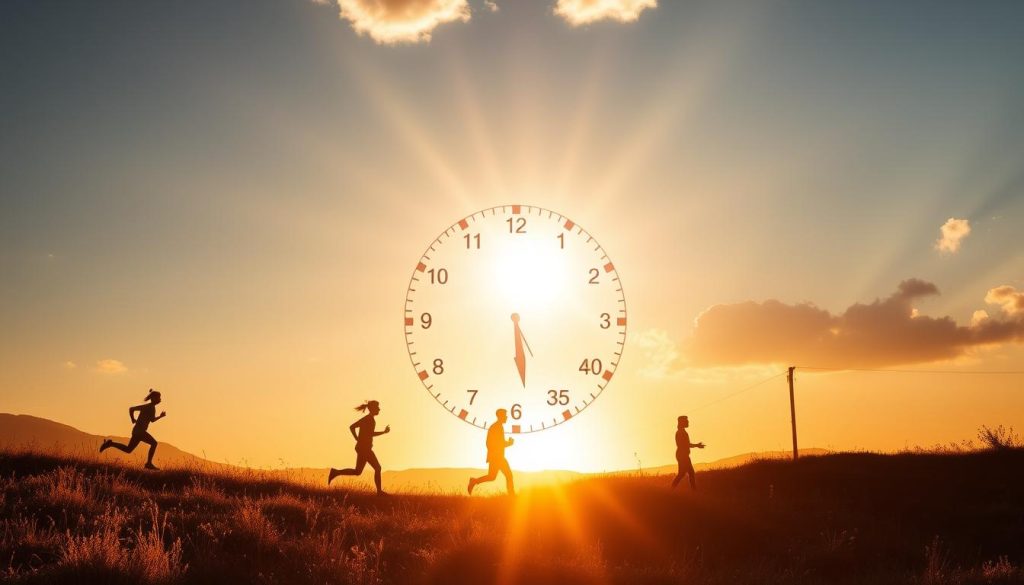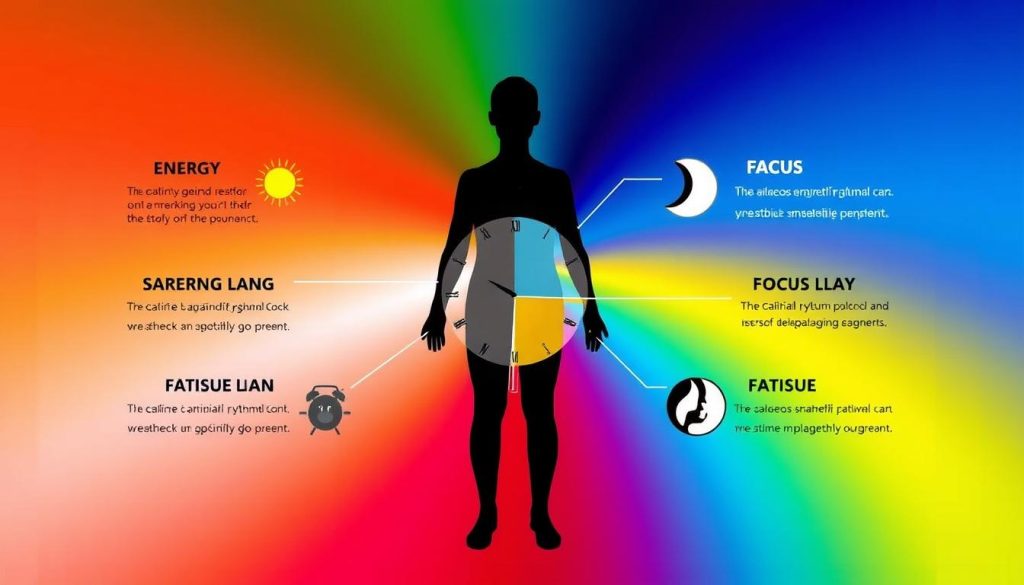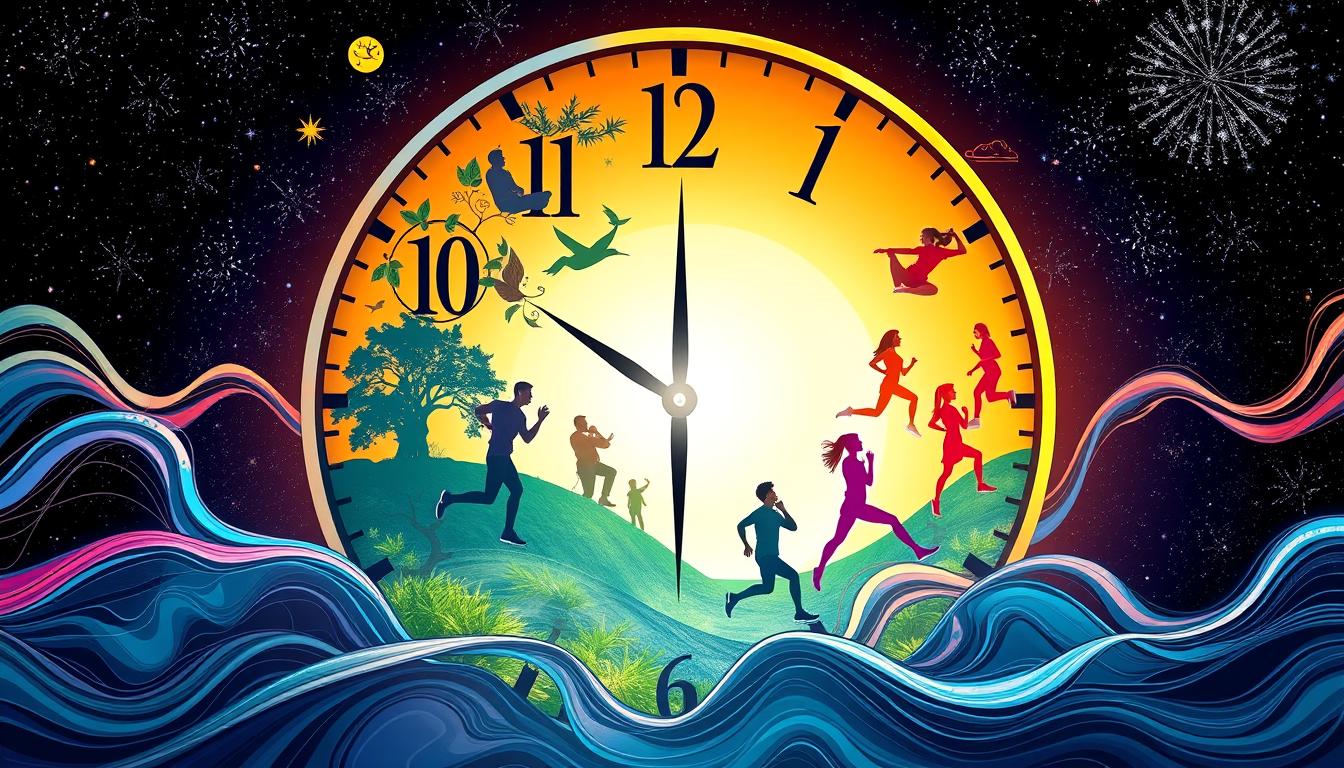I’ve found that knowing my circadian rhythm is key to peak performance. It shapes my daily life and boosts my productivity and wellness. By matching my activities with my body’s natural rhythms, I’ve seen big improvements in health.
Studies from the National Institutes of Health and Harvard Health Publishing back this up. They show that syncing my day with my body’s cycles can make a big difference. Let’s dive into how understanding my energy levels can help me reach my best.
Understanding Circadian Rhythm
Learning about circadian rhythm helps us understand our bodies better. These rhythms follow a 24-hour cycle and control many body functions. They affect when we sleep, hormones, and digestion. Knowing about these rhythms helps us do better in our daily lives.
What Is Circadian Rhythm?
The circadian rhythm is like our body’s internal clock. It runs on a 24-hour cycle and is influenced by light. As I go through the day, I see how it affects my alertness and sleepiness.
How Circadian Rhythms Affect My Body
Circadian rhythms do more than just control sleep. They also manage hormone release, body temperature, and metabolism. My energy levels, for example, match the daylight hours. But, changes in light or routine can mess with this balance, making me tired or less focused.
By understanding these rhythms, I can improve my productivity and health. It’s amazing how matching my activities with my body’s natural cycles can make a big difference in my day.
Recognizing My Peak Performance Times
Understanding when I’m most productive has been key to boosting my work. I’ve learned to recognize my peak hours through careful observation and smart time management. This knowledge helps me match my tasks with my energy levels, making me more efficient.
The Power of Time Management
Effective time management is essential for a better daily routine. I’ve found my most productive hours and schedule important tasks then. This way, I avoid distractions when I’m less energetic and use my best hours for big tasks.
How I Identify My Productive Hours
To find my best work times, I tracked my daily activities and energy. I noted when I felt most energized or tired. This helped me see patterns that changed how I work. Now, I tackle tough projects when I’m at my best, improving my productivity.

| Time of Day | Energy Level | Task Focus |
|---|---|---|
| 6 AM – 8 AM | High | Coding/Creative Work |
| 9 AM – 11 AM | Medium | Meetings/Communication |
| 1 PM – 3 PM | Low | Administrative Tasks |
| 4 PM – 6 PM | High | Strategic Planning |
Leveraging Circadian Rhythm for Enhanced Productivity
By matching my daily tasks with my energy levels, I’ve seen a big boost in productivity. Knowing when I’m most alert helps me plan my day better. This way, I do my most important tasks when I’m at my best.
Aligning My Tasks with My Energy Levels
Adjusting my work schedule to match my natural energy peaks has made me more efficient. I’ve noticed certain patterns in my day that help me know when to do what. Here are some strategies I use:
- Monitoring my energy levels: Keeping a journal helps me spot patterns.
- Scheduling demanding tasks in the morning: My focus is sharper then.
- Allocating routine tasks for mid-afternoon: This time is for less demanding tasks.
- Leaving creative work for late afternoon: This is when I’m most inspired.
Benefits of Working with My Body’s Clock
Working with my body’s clock has changed how I tackle daily tasks. It makes me feel less stressed and helps me use my energy better. Here are some benefits I’ve seen:
| Benefit | Description |
|---|---|
| Enhanced Focus | Aligning tasks with energy levels leads to sustained attention on important projects. |
| Reduced Stress | Following my natural rhythms minimizes overwhelm and fatigue by preventing overexertion. |
| Improved Mood | Accomplishing tasks during peak times promotes a sense of achievement and boosts morale. |
| Increased Creativity | Maximizing creative outputs during optimal times fosters innovative thinking. |
Circadian Rhythm and Peak Performance Times
Understanding my circadian rhythm helps me know when I’m at my best during the day. Studies show our bodies have different energy levels at different times. By doing tasks when I’m most alert, I can work better.
I usually feel most focused and creative in the late morning. This is when I can handle tough projects easily. But my energy goes down in the early afternoon. That’s when I do simpler tasks that don’t need a lot of thinking.
The table below shows when I’m most productive based on my energy levels:
| Time of Day | Energy Level | Recommended Activities |
|---|---|---|
| 6 AM – 9 AM | Low | Light exercise, planning |
| 9 AM – 12 PM | High | Creative work, problem-solving |
| 12 PM – 2 PM | Moderate | Routine tasks, meetings |
| 2 PM – 5 PM | High | Collaborative projects, analytical work |
| 5 PM – 7 PM | Low | Wind-down activities, review |
By understanding these patterns, I can do better in my daily tasks. Paying attention to my body’s energy cycles has really helped my productivity and happiness.

Food and Nutrition’s Role in My Circadian Rhythm
Nutrition is key to how I feel all day, linked to my circadian rhythm. Learning about food timing has boosted my energy. By planning meals, I boost productivity at the best times and match my diet with my body’s natural cycles.
Choosing the right foods at the right times has been a game-changer. Certain foods give me a big energy boost when eaten at the best times.
Eating for Energy: What I Learned
Exploring nutrition and circadian rhythm has been eye-opening. I found that some foods give more energy at certain times. In the mornings, I eat complex carbs like oatmeal and whole-grain toast to start my day right.
Lunch is lean proteins and fresh veggies, keeping my energy up. In the late afternoon, I choose light snacks with healthy fats and proteins, like nut butter and fruit, to stay focused.
The Best Foods to Eat at Specific Times
After trying different foods, I made a list of the best ones for each time of day:
| Time of Day | Recommended Foods | Benefits |
|---|---|---|
| Morning | Oatmeal, eggs, berries | Boosts energy and metabolism |
| Lunch | Grilled chicken, quinoa, salad | Sustains energy levels |
| Afternoon Snack | Greek yogurt, nuts, fruit | Prevents energy crashes |
| Dinner | Salmon, brown rice, steamed vegetables | Supports evening relaxation |
Choosing the right foods at the right times boosts my health and performance. By planning meals with my circadian rhythm in mind, I’m ready to tackle tough tasks with energy and focus.
How Sleep Patterns Influence My Performance
Learning about sleep patterns and performance has changed my life. Good sleep boosts my daily productivity. It’s key to match my rest with my best work times.
Prioritizing Sleep for Better Results
Quality sleep is a must, not a luxury. It boosts my focus, creativity, and decision-making. Bad sleep makes it hard to concentrate and lowers my energy.
Every night of good sleep helps my brain work better. This lets me tackle tasks with more energy.
Establishing a Sleep Routine
Setting routines is vital for better sleep. I try to sleep and wake up at the same time every day. This helps my body know when to relax.
My bedtime rituals include:
- Avoiding screens and bright lights an hour before bed.
- Doing relaxing activities like reading or meditation.
- Keeping my bedroom cool and dark for better sleep.
- Not drinking too much caffeine in the afternoon.
These habits have greatly improved my sleep. It shows how important sleep is for my top performance.

Anticipating Challenges in My Daily Routine
Every day brings its own set of challenges. These can affect how well I stick to my routine and keep my circadian rhythm in check. By recognizing these challenges, I can plan better and reduce disruptions. This helps me stay productive and feel better overall.
Recognizing Disruptors to My Circadian Rhythm
Many things can disrupt my circadian rhythm, impacting my daily life. These disruptors can come from my surroundings, habits, and lifestyle. Knowing what they are helps me make choices to lessen their impact.
- Environmental Impacts: Artificial lighting, noise, and changes in temperature can mess with my natural clock.
- Technological Distractions: Too much screen time, especially at night, can make it hard to stick to my routine and sleep well.
- Stressors: Daily stressors like work deadlines or personal tasks can upset my rhythm and lower my energy.
- Dietary Choices: Eating big meals late in the day can mess with my sleep and energy levels.
Understanding what disrupts my circadian rhythm helps me find ways to fight back. I can align my daily activities with my body’s natural rhythms.
| Type of Disruptor | Impact on Circadian Rhythm | Strategies to Mitigate |
|---|---|---|
| Environmental Impacts | Can lead to poor sleep quality | Use blackout curtains and white noise machines |
| Technological Distractions | Interferes with melatonin production | Limit screen time at least an hour before bed |
| Stressors | Limits focus and energy levels | Practice relaxation techniques like mindfulness |
| Dietary Choices | Affects sleep onset and duration | Eat lighter meals and avoid caffeine late in the day |
Practicing Mindfulness and Its Impact on Performance
In my quest for better performance, mindfulness has been a key factor. It boosts my focus and improves my mental health. By practicing mindfulness, I can calm my mind, leading to better task transitions and more productivity.
On busy days, mindfulness makes a big difference. Short breaks for mindful breathing or meditation help me recharge. This clarity of mind helps me face challenges head-on.
There’s a clear link between being productive and practicing mindfulness. As I grow in mindfulness, I achieve more and feel more satisfied. This shows me that mindfulness is crucial for anyone wanting to improve their performance.

